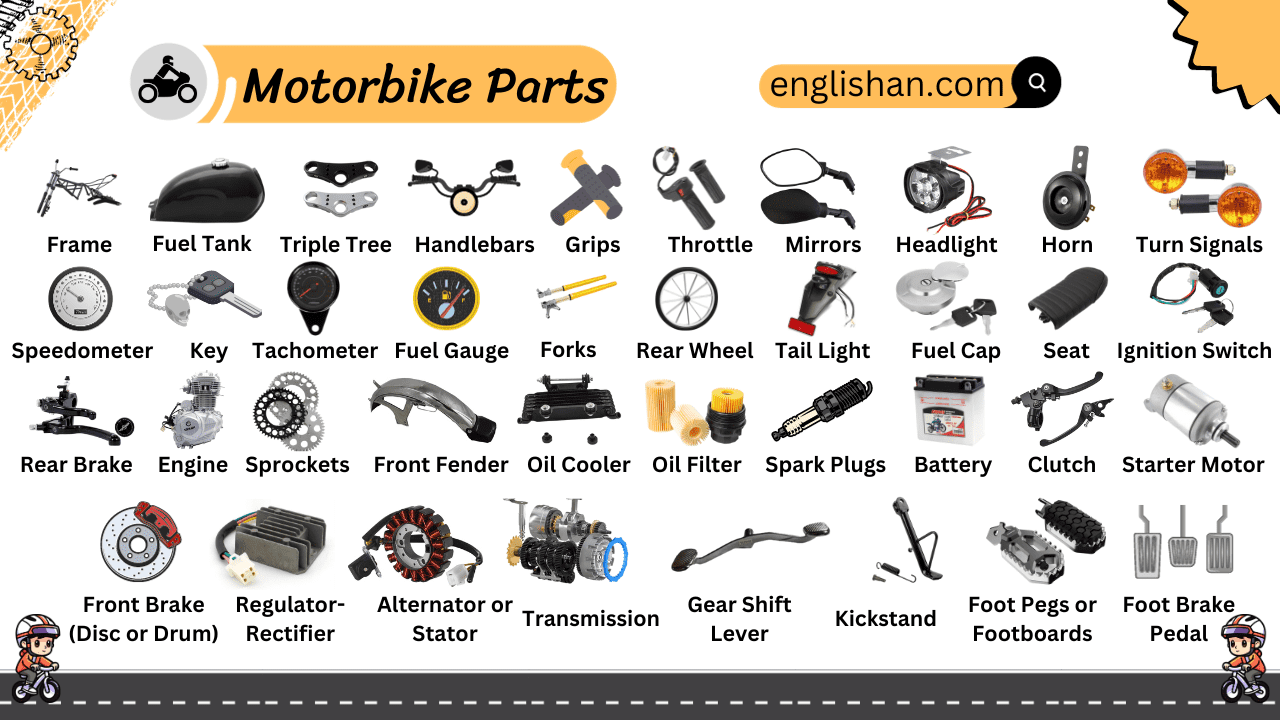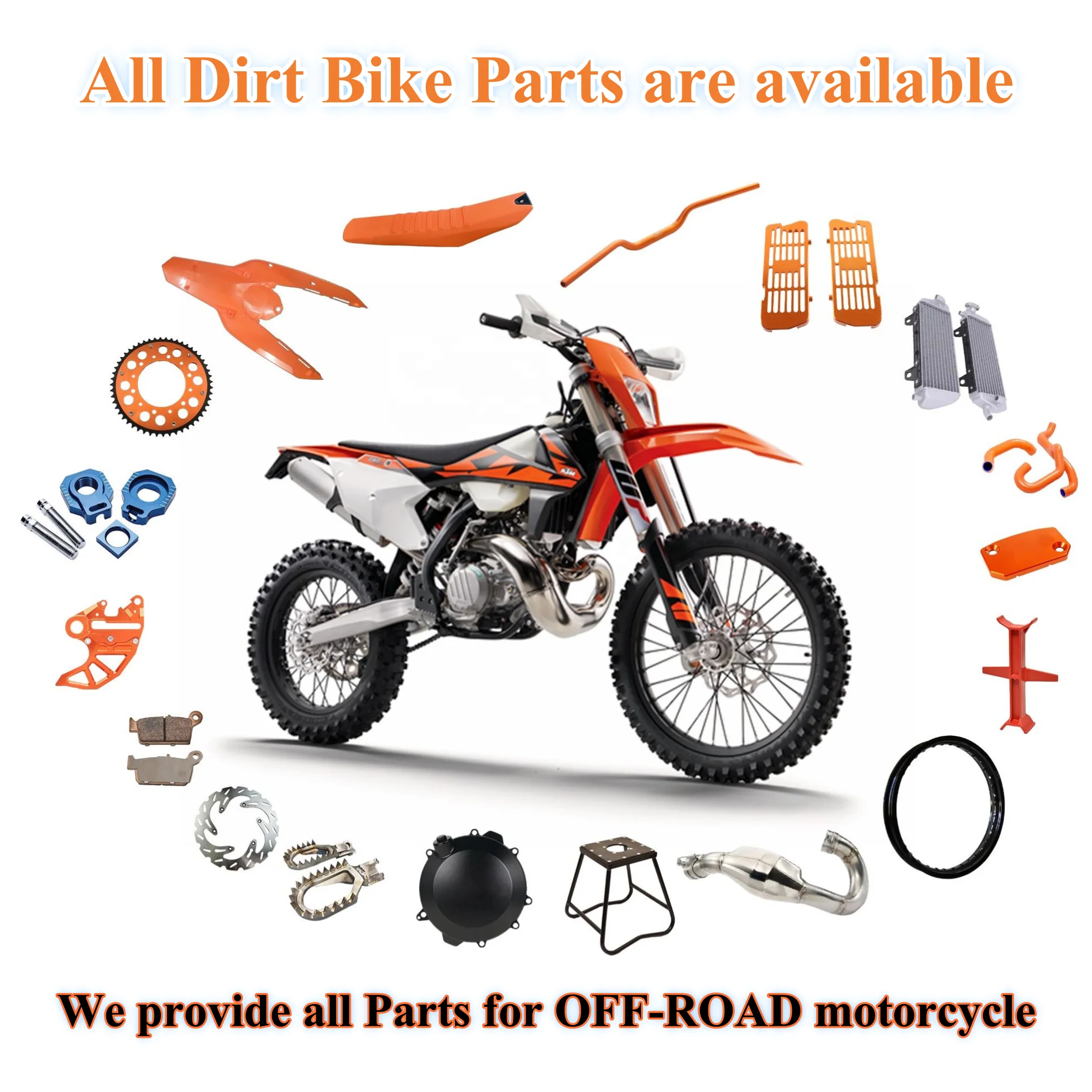Discover the Crucial MotorBike Components You Required for Ideal Efficiency
Comprehending the vital parts of a bike is basic for accomplishing peak performance. Each part, from the engine to the braking system, plays a critical duty in general capability and safety and security. Normal upkeep can avoid unanticipated failures and enhance the riding experience. However, numerous bikers ignore the complexities of these systems. Uncovering how they work together can bring about an extra reliable ride. What important parts should every cyclist focus on?
The Engine: The Heart of Your Motorcycle
The engine acts as the core component of a motorcycle, driving its performance and specifying its capacities. It is in charge of transforming fuel right into mechanical energy, which powers the bike forward. Various kinds of engines are utilized, including single-cylinder, V-twin, and inline configurations, each offering distinct qualities suited for different riding objectives and designs. The engine dimension, normally gauged in cubic centimeters (cc), substantially affects efficiency, with bigger engines normally supplying more power and torque.Furthermore, the engine's style and innovation, such as fuel shot systems or air-cooling versus liquid-cooling, impact efficiency and reliability. Upkeep is necessary for peak operation; factors like regular oil changes and monitoring ignition system warranty durability. Riders often think about an engine's responsiveness and smoothness, as these features improve the overall riding experience. Ultimately, the engine continues to be an important aspect that defines not just the motorbike's efficiency yet likewise the rider's link to the device.
The Transmission: Changing Gears Smoothly
The transmission plays an important duty in a motorcycle's performance, especially in the mechanics of equipment shifting. Comprehending how to change gears smoothly can boost the overall riding experience, while routine upkeep assurances peak functionality. Appropriate focus to these facets can substantially influence the longevity and performance of the bike.

Gear Shifting Mechanics
Smooth gear moving is essential for suitable motorbike performance, considerably impacting both acceleration and control. The technicians of gear shifting include the communication in between the clutch, equipment lever, and transmission system. When a biker involves the clutch, it disengages the engine from the transmission, allowing for a gear modification without harming the parts. A well-timed release of the clutch, combined with accurate motion of the equipment bar, facilitates a seamless modification in between equipments. This procedure assures that the engine operates within its best power band, improving performance. Motorcycle Spares Christchurch. Additionally, understanding the gear ratios and their impact on speed and torque can assist motorcyclists make educated selections throughout changes, inevitably adding to an extra receptive and delightful riding experience
Maintenance Tips Significance
Regular maintenance plays a crucial duty in guaranteeing that the transmission system operates effectively, permitting smooth gear shifts. Frequently inspecting and altering the transmission liquid is essential, as old liquid can cause enhanced friction and wear. Additionally, inspecting the clutch for wear guarantees peak involvement and disengagement, protecting against slippage throughout equipment changes. Lubrication of moving components is similarly essential to decrease rubbing and boost performance. Motorcycle owners ought to also check for leakages and unusual sounds, as these can indicate underlying concerns. By adhering to these upkeep ideas, bikers can prolong the life-span of their transmission system, ensuring that equipment shifts continue to be smooth and contributing to the total performance of their motorbike.
The Braking System: Ensuring Security on Every Ride
Braking systems are essential components that straight affect a motorbike's safety and efficiency. They contain numerous parts, consisting of brake pads, rotors, calipers, and hydraulic lines, all interacting to ensure effective slowdown. The sort of braking system-- typically either disc or drum-- impacts responsiveness and stopping power.Regular maintenance is important to maintain peak efficiency; worn brake pads can bring about decreased efficiency and increased quiting ranges. Additionally, the top quality of brake fluid must be monitored, as it can take in dampness over time, jeopardizing stopping efficiency.Riders should likewise take into consideration the significance of anti-lock stopping systems (ABDOMINAL MUSCLE), which prevent wheel lockup during sudden quits, enhancing general security. Effectively functioning brakes are not almost quiting; they instill confidence in the biker, enabling safer navigating through different terrains. Ultimately, a dependable braking system is essential for taking pleasure in every ride with tranquility of mind.
The Suspension: Enhancing Comfort and Control
A well-functioning shock absorber considerably adds to a motorbike's overall efficiency, enhancing the performance of the braking system. The suspension plays a considerable role in absorbing shocks from irregular surface areas, guaranteeing a smoother ride while keeping tire call with the road. This call is necessary for both stability and control, allowing cyclists to browse corners with self-confidence and precision.Different sorts of suspension systems, such as telescopic forks or check it out mono-shocks, provide differing degrees of comfort and handling. Properly tuned suspension boosts responsiveness, supplying the biker with an extra linked feel to the motorcycle. Routine upkeep checks are very important to establish the suspension components, consisting of springs and dampers, are working at their finest. A reliable suspension system not just raises the riding experience however likewise adds to the long life of other motorcycle parts by decreasing deterioration. Because of this, spending in high quality suspension is vital for any type of serious motorcycle enthusiast.
The Tires: Linking You to the Roadway
Tires play a necessary role in a motorcycle's performance, serving as the key link between the road top article and the cyclist. Understanding the various kinds of tires offered can considerably impact managing and safety and security. Additionally, routine upkeep is vital to ensure peak tire efficiency and long life.
Tire Keys In Explained
How do different tire types affect a motorcycle's efficiency? Tire kinds play an important function in identifying a motorcycle's grasp, security, and handling. Sporting activity tires, designed for high efficiency, deal enhanced grip and responsiveness on paved roads, making them optimal for competing and hostile riding. Alternatively, visiting tires focus on durability and comfort, providing a smoother trip for long-distance travel. Off-road tires, defined by their rugged walk patterns, stand out in traction on unpaved surfaces, ideal for journey fanatics. In addition, dual-sport tires mix characteristics from both on-road and off-road classifications, catering to flexible riding needs. Ultimately, selecting the appropriate tire kind is necessary for maximizing efficiency, making sure security, and improving the overall riding experience.
Maintenance Tips Offered
While riding when traveling, preserving optimal tire condition is vital for safety and efficiency. Consistently examining tire stress is essential, as under-inflated tires can result in poor handling and raised wear. It is a good idea to check tread deepness regularly; used tires compromise hold and security. On top of that, cyclists should search for indications of damages, such as fractures or bulges, which can suggest the demand for substitute. Revolving tires regularly ensures also use, enhancing long life. Maintaining tires clean from particles and preventing too much curbs can extend their lifespan. Preserving correct alignment and equilibrium adds to peak performance, lessening stress and anxiety on various other bike components. Sticking to these upkeep tips will considerably enhance the general riding experience.
The Fuel System: Sustaining Efficiency and Efficiency
The fuel system plays a crucial duty in making the most of a motorcycle's efficiency and performance, as it assures the optimal delivery of fuel to the engine. It makes up a number of essential components, including the fuel storage tank, gas pump, gas filter, and gas injectors or carburetor. Each component must function successfully to assure my website a powerful and smooth ride.The fuel tank stores gas and supplies it to the engine through the fuel pump, which produces the needed stress. A fuel filter stops impurities from entering the engine, while the injectors or carburetor mix gas with air for combustion.Proper upkeep of the gas system is essential; a stopped up filter or malfunctioning injector can bring about reduced performance and enhanced fuel consumption. By confirming that the gas system runs successfully, motorcyclists can appreciate enhanced throttle action, much better fuel economic situation, and on the whole boosted riding experience.
The Electrical System: Powering Your Trip
An efficient electrical system is essential for the overall capability and safety and security of a motorcycle, as it powers vital components such as the ignition, lighting, and numerous electronic systems. This system includes the battery, which shops energy, and the alternator, in charge of producing power while the engine runs. The wiring harness connects these elements, guaranteeing reputable power distribution.Additionally, fuses shield the system from overloads, while relays assist control high-current tools with low-power signals. A well-kept electrical system improves performance by making sure smooth starts and regular operation of signals and lights, important for cyclist exposure and safety.Regular checks of the battery's cost and connections are essential for stopping electrical failures. Motorcyclists need to also evaluate circuitry for deterioration, making sure all components work preferably. Eventually, a durable electrical system contributes substantially to the overall performance and dependability of the motorcycle.
Frequently Asked Concerns
Just how Frequently Should I Change My Motorcycle's Battery?
The frequency of motorbike battery substitute depends on usage and upkeep (Motorcycle Spares Christchurch). Typically, batteries must be changed every three to five years. Routine checks can assist recognize when a substitute is required for peak performance
What Tools Do I Required for Standard Bike Upkeep?
For basic motorcycle maintenance, one needs necessary devices such as an outlet collection, wrenches, screwdrivers, pliers, tire stress scale, and a torque wrench. These devices facilitate effective upkeep and guarantee the motorcycle runs effectively and safely.
Exactly How Can I Enhance My Motorbike's Aerodynamics?
To enhance motorbike aerodynamics, one must consider changing fairings, utilizing windscreen extensions, optimizing body position, and decreasing general weight. These adjustments assist decrease drag, enhancing stability and gas performance throughout adventures.
What Are the Indicators of a Failing Electric System?
Indications of a stopping working electric system include dimming lights, difficulty beginning, uneven instrument readings, and blown integrates. Motorbike Components NZ. Unusual smells or corrosion around battery terminals might likewise suggest underlying issues requiring prompt interest for safety and efficiency

How Do I Choose the Right Oil for My Bike?
When picking oil for a motorbike, one ought to consider the manufacturer's requirements, thickness scores, and the sort of riding. Additionally, traditional versus synthetic oil can influence performance and engine protection, affecting the decision considerably. The engine dimension, normally determined in cubic centimeters (cc), significantly influences efficiency, with larger engines usually supplying more power and torque.Furthermore, the engine's layout and innovation, such as fuel shot systems or air-cooling versus liquid-cooling, influence performance and reliability. A well-functioning suspension system greatly adds to a motorbike's general efficiency, matching the performance of the braking system. The gas system plays an essential role in making best use of a motorcycle's efficiency and effectiveness, as it guarantees the optimum delivery of gas to the engine. A gas filter avoids impurities from going into the engine, while the injectors or carburetor mix gas with air for combustion.Proper maintenance of the fuel system is critical; a stopped up filter or malfunctioning injector can lead to lowered performance and boosted gas consumption. A properly maintained electrical system enhances efficiency by making certain smooth starts and constant procedure of lights and signals, important for cyclist visibility and safety.Regular checks of the battery's fee and links are important for avoiding electric failings.